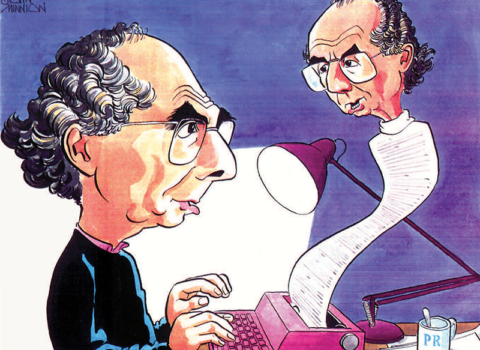By Joshua Cohen, from Attention! A (Short) History, published this month in the United Kingdom by Notting Hill Editions. Cohen, a contributing editor of Harper’s Magazine, is the author, most recently, of a short-story collection, Four New Messages.
a) You are a woman working as the sole typist at a factory. You work on the office floor above the production floor. Last week you’d typed an interoffice memo from the owner to the manager telling him to “prepare a report on the suitability of employing women in our workplace,” but then this week you typed an interoffice memo from the manager to the production chiefs telling them to “prepare reports on the effect on our workplace of employing women,” which implied, to you at least, that a decision had been made, that female workers would be hired. You are conflicted. You are confused.
b) The reports are submitted, handwritten, and you type them up. No consensus is achieved. One notes that approx. 20% of the U.S. workforce is women; another notes that approx. 20% of U.S. women work. Labor statistics, phys/psych studies, are cited: “melancholy,” “morbidity,” “hysteria,” “neuroses.” Other data are anecdotal, or polemic — political pamphlets for and against. One report insists that an increase in women working led to an increase in profits; another insists to a decrease; another insists to an increase, but in agriculture (which strikes you as a false standard for manufacturing, because factory workers don’t live at their factories, but farmers live and work on their farms); another insists to a decrease, but in agriculture (which strikes you as a false standard for manufacturing, because factory workers don’t eat and drink their own products for sustenance); while yet another insists that, percentagewise, the number of working women didn’t increase, but merely stayed in line with previous figures (80% of all typists share your gender). The only datum you can establish definitely is that between the Censuses of 1890 and 1900 the state of Iowa lost two people, one to a head wound from a horse newly shod (your father), the other to tuberculosis (your mother). Council Bluffs, from where you escaped. Even the Sioux had gotten out of there.
c) You live on Greenwich Lane with another typist (at another firm). Loves suffrage, hates temperance. Irish Catholic but an orphan, too, and so a sister nonetheless. Her father collapsed in the Park Avenue Tunnel, her mother from the Russian grippe. She’ll try to get you out dancing tonight, to celebrate her new schedule: from working six days per week to working five. Still eight hours per day, now forty per week. Her Friday nights are now free. Saturdays, too. You suspect this has to do with the unions, or socialists, or communists, or Jews. But you can’t go out dancing tonight, because you’re still working six days. You’re not disappointed, however. You suspect that with her newly weekly bookkeeping sessions on Mondays, and her newly weekly training sessions on Wednesdays, designed to familiarize her with the new comptometer calculating machines under the tutelage of their new sales representative, your roommate’s total work time, despite the Saturday reprieves, will actually increase.
“The weekend.” You go to work on Saturday just as your roommate’s coming back, babbling about the sales rep — “built like the Fuller Building” — who goes to a gymnasium where he walks on a rubber path that goes nowhere and bicycles in place. You take the subway, though as your office is on 46th Street you’re never sure which stop, 42nd or 50th. Your home stop is as far away as 14th Street, but you don’t mind the walk. Strange times when you can trust the Wright Bros. over a cruise on the General Slocum. You come back from work on Saturday and your roommate is gone, and you stay up waiting for her, reading the comptometer manual.
d) On Sunday you shut all the doors and windows, from embarrassment. You go to your wardrobe, set aside the folded waists, reach below the automobile bonnet, but above the fleecy nullifiers. The typewriter you pinched and skimped for. A device of your own, to use at home, alone, this is what embarrasses you. As Sunday turns, you complete the reports, with stricter concentration than at the office. No ticktacky stock jottings. No bell-ringing cold candlesticks. But you’ve never worked this late before. You’ve never even stayed up this late before. Your roommate still hasn’t come back. You doubt that she’s at mass.
You consider the conclusions: female employment should be confined to the office; should be confined to the unmarried population (“widows and spinsters included”). “A dainty danger.” “Spare perilous distraction.” “Manual labor dulls the feminine.” “Women make excellent typists, but the manual dexterity and concentrative capacities peculiar to the typewriter do not transfer to the production floor.” The manager who’d asked you out to Coney Island a season ago and is still waiting for an answer: “Women are naturally less productive than are men. Though it is our policy to pay weekly wages, if women are to be hired it is recommended to pay them instead on the basis of piecework. To pay them a wage equal to a man’s, for work in no way equal to a man’s, is unjust. To pay them per piece is to recognize women’s unique maladies, enabling them to moderate their health, and us to moderate our payroll. It might also serve to foster a sense of competition that would accrue to mutual benefit.” 2¢/page.





























































































